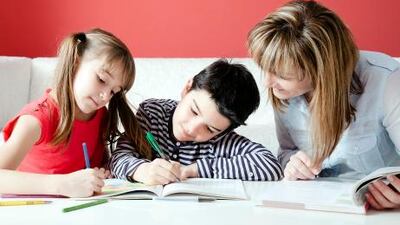The summer holiday is a long one for schoolchildren. Parents may be surprised to learn that it's also, potentially, a damaging one. The findings of a recent study by Harris Cooper, a professor of psychology and neuroscience at Duke University in North Carolina, suggest that children typically "forget" between one and three months of schooling during the break.
Maths skills were particularly badly affected in the survey, as they are dependent on memory. As for reading, while middle-class children improved over the summer (because independent reading tends to be an ingrained practice in middle-class homes) their working-class peers suffered marked deterioration, a classic demonstration of what's known in educational circles as "faucet theory", where resources for the poor are turned off during the holidays.
For Cooper, this pattern explained the "achievement gap between those who have financial resources and those who don't" and he suggested a simple solution: summer learning programmes. This sounds like a severe, less-than-fun way to spend a summer holiday when, many parents would argue, children ought to be relaxing away from the increasingly pressured environment of school.
Like many educationalists, Cooper feels the long summer holiday is an anachronism - a hangover in many cases from an agriculture-based economy. Now politicians are starting to feel the same: earlier this year, the Dutch education minister Marja van Bijsterveldt put forward draft legislation to shorten Dutch schools' summer holidays from seven weeks to six, though it was bitterly opposed by teaching unions.
Still, Cooper told the National Summer Learning Association in the US that he believed summer afforded "more freedom to digress from a prescribed curriculum, so you can study at a more leisurely, individualised pace". Which is a roundabout way of saying you can do more or less what you like as long as it has educational value.
With this in mind, then, here are some summer activities to train (rather than drain) the brain:
Design a treasure hunt
Hide treats around your home. The trick here is to make the clues brain-teasing questions or riddles that relate to where you've hidden things.
Go through family photos
Children are fascinated by the past, and old photographs are a brilliant way to bring it to life, especially if they feature known people. Encourage them to think about technology (why are the cars different?), fashion (why is Auntie Marge wearing that awful dress?) and war (how come the house Granddad is standing in front of no longer exists?). You could even discuss the nature of photography itself. Why is a particular image black and white? What is the difference between digital and chemical photography?
Play a board game
In a world of Nintendo DS and Wii, it's hard to convince children of the value of board games. The gameplay will feel slow to them at first and the rules hard to learn. Persevere, though, and you will have a brilliant time. Children are both competitive and acquisitive, qualities that lend themselves to Monopoly. But my seven-year-old loves the mystery-solving element of Cluedo (the "classic" format, not the tacky relaunched version). And despite the game's fearsome cerebral reputation, the basics of chess are by no means beyond primary-age children.
Put on a play
Find a box of dressing-up clothes and help your cast devise a plot. Discuss how acts and scenes work, and how dialogue moves the story along while teaching us about a character. Think about different types of plays. Will this be a pantomime or a serious drama? Why, in Shakespeare plays, do people often speak in verse? Is it true that in the old days the groundlings in the stalls used to talk through the performance and throw things at the actors?
Write a story
Buy them a beautiful, cloth-bound pad or similar ornate notebook and a quill pen. Give basic instructions: the story should be in a certain genre, should feature four characters, should take place by the seaside. Then step back and let them get on with it.
Tie-dyeing
Easier than it sounds, plus your kids won't have any preconceptions about hippies and nasty market stalls. Get some old white T-shirts. Fold them up and tie them with rubber bands or string and leave them to soak in a fabric dye. How is the effect produced?
Make biscuits
It's so simple, you can't go wrong. Well, you can, but not if you use this recipe: mix together 250g butter, softened; 140g caster sugar; 1 egg yolk; 2 tsp vanilla extract; 300g plain flour. Roll out the resulting dough, cut into strips, place on a baking tray and cook for 15 minutes at 180°C. Get children to measure out the ingredients; also to think about why they might need more of one ingredient, flour, say, than another.
Make a city out of boxes
Shoeboxes are good, though you can use bigger ones for public buildings. Paint them, cut door- and window-holes, design their interiors, then arrange them around the room. Tell stories about the houses you've made. Why have you arranged them in a particular way? (Where should the hospital be in relation to the block of flats?) Where should the roads go? What about trees, fountains and sculptures to brighten the place up a bit?

